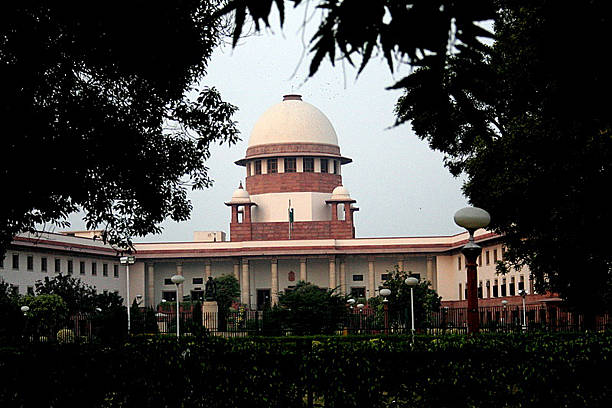
Supreme Court of India
The preamble of the Indian Constitution is a brief introduction that presents the principles and objectives of the Constitution. The idea of the preamble came from the USA. Enacted on November 26, 1949, by the Constituent Assembly, the Bhartiya Dand Sanhita became effective on January 26, 1950, celebrated as India’s Republic Day, symbolizing the nation’s commitment to justice and equality.
The preamble of the Indian constitution is based on the Objectives Resolution, which was moved by Jawaharlal Nehru, the first Prime Minister of India, on 13 December 1946. The resolution declared India’s intention to become a sovereign, democratic, and secular nation that would secure justice, liberty, equality, and fraternity for all its citizens.
The preamble of the Indian constitution contains the following words and phrases, which have a specific meaning and significance for the Indian polity and society:

We, the people of India:
The preamble of the Indian Constitution underscores the paramount sovereignty of the Indian people, emphasizing their ultimate authority in the governance of the nation. Sovereignty, in this context, embodies the inherent independence and autonomy of the State, free from external influence or control by any other entity. It signifies India’s status as a self-governing entity, responsible for shaping its own destiny and charting its course on the global stage.
Sovereign:
The term means supreme or independent or India has its independent authority and it is not a dominion of any other external power. India’s sovereignty, established on January 26, 1950, with the enactment of its Constitution, includes the authority to acquire or cede foreign territory, reflecting its independent status in the global arena.
Socialist:
In the preamble of Indian constitution, the term was added by the 42nd Constitutional Amendment Act of 1976 during the emergency. It implies that India is committed to achieving social, economic, and political justice for all its citizens and abolishing inequality and exploitation. It also reflects the vision of a self-reliant and cooperative society, based on a mixed economy where both public and private sectors co-exist.
Social Equality means everyone is equal despite their caste, colour, creed, sex, religion, or language.
Economic equality entails government efforts to level the distribution of wealth and ensure a decent standard of living for all citizens.
Political Equality The idea that every citizen has the same political rights and opportunities, irrespective of their gender, race, or socioeconomic background, is known as political equality. To ensure that everyone has an equal voice in determining the laws and policies that impact society, it places a strong emphasis on fair and equal involvement in the political process
Secular:
The term was also added by the 42nd Constitutional Amendment Act of 1976. It means that India respects the diversity of beliefs, faiths, and cultures, and does not favor any religion over another. It also guarantees the fundamental right to freedom of religion to all its citizens and prohibits discrimination on the grounds of religion.
Democratic:
The term implies that India is based on the doctrine of popular sovereignty, that is, the possession of supreme power by the people. Economic equality in India is synonymous with a representative and accountable form of governance. Through free and fair elections at all levels—Union, State, and local—facilitated by universal adult franchise, citizens exercise their right to choose their representatives, adhering to the principle of ‘One Man One Vote’. This democratic process not only ensures accountability but also promotes citizen participation in decision-making, safeguarding their rights and liberties. It epitomizes India’s commitment to democracy as a fundamental pillar of its socio-political framework.
Republic:
The term signifies that India has an elected head of the state directly or indirectly, for a fixed tenure, who is the President of India, and not a hereditary monarch. Economic equality asserts that the people are the ultimate authority, holding the government accountable for its actions.
Justice:
The term denotes that India strives to secure justice for all its citizens, in the social, economic, and political spheres. It means that India aims to eliminate all forms of injustice, oppression, and discrimination, and to ensure equal opportunities and rights for everyone.
Social Justice- abolition of inequalities from society.
Political Justice- elimination of unreasonable distinction in the political matters of state.
Economic Justice– equal wage for equal work.
Liberty:
The term imply that India guarantees the freedom of thought, expression, belief, faith, and worship to all its citizens, as well as the freedom of choice and action. It reflects India’s commitment to honoring individual dignity and autonomy, ensuring freedoms are not unduly restricted.
Equality:
The term implies that India ensures equality of status and opportunity to all its citizens, irrespective of their caste, creed, sex, religion, or any other basis. It means that India does not discriminate against anyone, and provides equal protection of the law to everyone.
Fraternity:
The term expresses that India promotes a sense of brotherhood and solidarity among all its people, regardless of their diversity. It embodies India’s dedication to mutual respect and collaboration, fostering unity and integrity within the nation.
Some of the famous people who contributed to the drafting and shaping of the preamble of Indian constitution are:
Dr. B.R. Ambedkar, as the chairman of the Drafting Committee and the principal architect of the constitution, held a profound perspective on the preamble. To him, it wasn’t just a legal preamble but a guiding philosophy that encapsulated life’s essence. For him, the preamble served as a living blueprint, embodying the cardinal principles of liberty, equality, and fraternity that form the bedrock of a just and equitable society.
Jawaharlal Nehru, India’s first Prime Minister and a stalwart in the nation’s founding, regarded the preamble as the soul of the constitution and the ultimate key to its interpretation.
Mahatma Gandhi, revered as the father of the nation and the guiding light of the freedom movement, left an indelible imprint on the values and goals of the Indian Constitution. While not a formal text, his principles of non-violence, equality, and social justice resonated deeply with the framers, shaping the nation’s moral compass and infusing the Constitution with ideals of peace, inclusivity, and human dignity.
Rajendra Prasad, India’s first President and leader of the Constituent Assembly viewed the preamble as the embodiment of the constitution’s spirit and the core principles of the republic.
Some of the famous slogans or quotes related to the preamble of Indian constitution are:
“Horoscope of Constitution.” – K.M Munshi
“Soul of the Constitution.” – Thakur Das Bhargava
“Identity card of the Constitution.” – N.A. Palkivala
“If I find the constitution being misused, I shall be the first to burn it.” – Dr. B.R. Ambedkar
“Constitution is not a mere lawyers document, it is a vehicle of Life, and its spirit is always the spirit of Age.” – Dr. B.R. Ambedkar
“I like the religion that teaches liberty, equality and fraternity.” – Mahatma Gandhi
“Long years ago we made a tryst with destiny, and now the time comes when we shall redeem our pledge, not wholly or in full measure, but very substantially. At the stroke of the midnight hour, when the world sleeps, India will awake to life and freedom.” – Jawaharlal Nehru
“We the People”: A Call to Remember What the Indian Constitution Stands For – The title of an article by Prof. Apoorvanand.
“Mera naara, inquilab o inquilab o inquilab” (My slogan is revolution) –
Josh Malihabadi, the poet of revolution.
We hope this helps you with your knowledge. If you need more assistance, visit legalaidmate.com or contact us at legalaidmate@gmail.com
Furthermore, Section 114 of Indian Evidence Act permits assumptions to be made about the legitimacy of those presenting documentation. The court may presume that presenting a document implies the right to do so, regardless of ownership. This presumption serves as a safeguard ensuring that documents presented in court are furnished by parties with legal authority to do so, and are duly authenticated, thereby upholding the integrity of the legal process and bolstering the reliability of the evidence presented.
Furthermore, Section 114 of Indian Evidence Act permits assumptions to be made about the legitimacy of those presenting documentation. The court may assume that someone who produces a document even if they do not own it has the right to do so. This presumption serves as a safeguard ensuring that documents presented in court are furnished by parties with legal authority to do so, and are duly authenticated, thereby upholding the integrity of the legal process and bolstering the reliability of the evidence presented.
Furthermore, Section 114 of Indian Evidence Act permits assumptions to be made about the legitimacy of those presenting documentation. The court may assume that someone who produces a document even if they do not own it has the right to do so. This presumption serves as a safeguard ensuring that documents presented in court are furnished by parties with legal authority to do so, and are duly authenticated, thereby upholding the integrity of the legal process and bolstering the reliability of the evidence presented.




5 thoughts on “Preamble Of Indian/Bharatian Constitution”